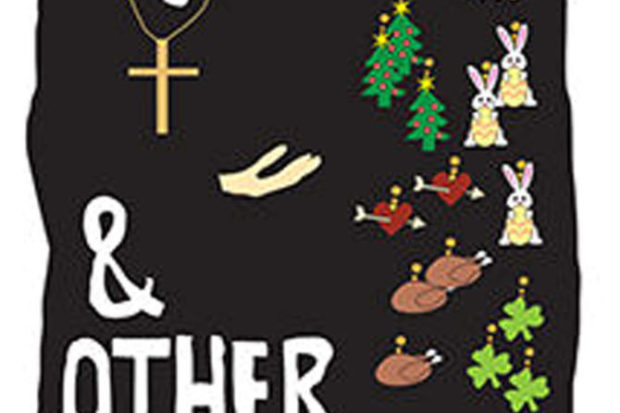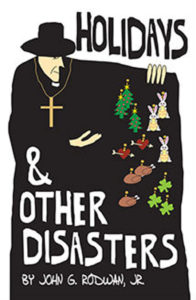
By George B. Kauffman
 Holidays and Other Disasters by John G. Rodwan, Jr., considers the major U.S. holidays from an atheist’s perspective. It specifically examines religious holidays, those that have a definite if not always acknowledged religious thrust and secular holidays that had religious elements added on by way of personal stories, usually the author’s own. Of course, holidays aren’t about religion alone, and this delicately nuanced volume doesn’t view them as pageants of piety. Instead, it considers the various issues holidays raise, including race and class, and it discusses other forms of expressive activity like literature, music and sports, along with religion and holiday rituals.
Holidays and Other Disasters by John G. Rodwan, Jr., considers the major U.S. holidays from an atheist’s perspective. It specifically examines religious holidays, those that have a definite if not always acknowledged religious thrust and secular holidays that had religious elements added on by way of personal stories, usually the author’s own. Of course, holidays aren’t about religion alone, and this delicately nuanced volume doesn’t view them as pageants of piety. Instead, it considers the various issues holidays raise, including race and class, and it discusses other forms of expressive activity like literature, music and sports, along with religion and holiday rituals.
Rodwan is a non-Catholic who attended a Catholic high school, which was superior to the public schools in his area. The Jesuits “convinced [him] not to be cajoled into faith by a contradictory anthology of fanciful fictions and fiery enjoinders.”
Rodwan proclaims: “Like Christopher Hitchens, I regard myself not only as an atheist who does not believe but also as an ‘antitheist’ who maintains ‘that all religions are versions of the same untruth’ and that ‘the influence of churches, and the effect of religious belief, is positively harmful.’ I’ve always felt the burden of proof lies with the believers. I would need a reason to believe in God, any god, and to accept all that seems to come along with religion—the persecution and violence, the disregard of evidence, the veneration of faith over intellect—and I have not seen one yet.”
On Feb. 14, 1989, Iran’s Ayatollah Ruhollah Khomeini announced the fatwa denouncing the author of The Satanic Verses (1988) and encouraging the faithful to slaughter him. Yet in his life and writings, Sir Salman Rushdie embodies Valentine’s Day and the value of love far more than the Ayatollah.
In the chapter on Easter, Rodwan cites the fear of death as the basis for much religion. He quips, “We don’t really die, see, we come back, like He did, on the Sunday after Good Friday.” He adds that doubting Thomas is used to present the pernicious notion that faith is superior to belief based on evidence (John 20:29). He also cogently but jokingly states, “More striking, to me, than biblical incongruity is the insipidness of the risen Jesus. He didn’t die for our sins. He overslept for them.”
According to Rodwan, “One of the reasons that the Bible survives from one century to the next, despite its decidedly uneven literary merit, is because youngsters are encouraged to be faithful rather than critical and to believe what parents and teachers tell them rather than to read the venerated document. Atheists and agnostics tend to have better knowledge of the religions they reject than those professing belief.”
Juneteenth, the oldest celebration marking the end of slavery in the United States, a holiday unknown to me, was first observed on June 19, 1865, two and a half years after Abraham Lincoln’s Emancipation Proclamation went into effect, It has Rodwan’s eminent approval, as does Martin Luther King Day, although he feels that King’s religious views were unnecessary for a man who was a truly good human being.
From 1776 on, Independence Day honored an unrealized ideal. The country that declared a commitment to liberty denied many residents their freedom. On July 4, 1910, flamboyant Black boxer Jack Johnson defeated Jack Jeffries, “the Great White Hope,” resulting in celebrations in Black neighborhoods, which were met with violent riots.
Among the other holidays discussed are Groundhog Day, April Fool’s Day, May Day, Labor Day, St. Patrick’s Day, Columbus Day, Mother’s Day, Father’s Day, Hallowe’en, Kwanza and, of course, Christmas. Figuring prominently in Rodwan’s stories are the progressive or reactionary figures of Jackie Robinson, Cassius Clay (Muhammad Ali), Arthur Ashe, Eugene V. Debs, Clarence Darrow, Samuel Gompers, Pius XII, Francisco Franco, the Pinkertons, J. Edgar Hoover and many others.
Regarding the iconic disaster of our time, Rodwan declares, “I never expected what happened on September 11 to function as a ‘wakeup call’ to prompt widespread recognition that religious faith—and I mean religious faith in general and not loyalty to one specific brand of it—is not necessarily a positive quality and doesn’t always bring out the best in people. If September 11 didn’t make people see faith’s dangers, what would it take?”
In an “Afterword: A Nonbeliever’s Holiday Wish List,” Rodwan states, “I’ll end with some things I’d like, but don’t expect to see happen.” However, he concludes on a positive note: “Finally, I’d like to raise a glass to my fellow advocates of freedom of thought, freedom of inquiry, freedom of speech and freedom from compulsion to participate in religious rituals. Cheers.”
A note in passing: Certain perfectly legitimate terms have recently acquired a pejorative character. Many atheists and liberals prefer to call themselves humanists and progressives, respectively. Similarly, millennials are now avoiding the terms environmentalists and feminists. Why are we ashamed of our beliefs?
*****
George B. Kauffman, Ph.D., chemistry professor emeritus at Fresno State and a Guggenheim Fellow, is a recipient of the American Chemical Society’s George C. Pimentel Award in Chemical Education, the Helen M. Free Award for Public Outreach and the Award for Research at an Undergraduate Institution, and numerous domestic and international honors. In 2002 and 2011, he was appointed a Fellow of the American Association for the Advancement of Science and the American Chemical Society, respectively.
